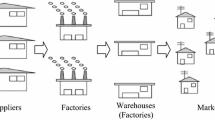Abstract
Supply chain network design is to determine factories and distribution centers to produce and distribute products, in order to satisfy the demand of customers to some extent. Supply chain network design plays an important strategic role in supply chain management and faces kinds of uncertainties, such as uncertain demand and cost. In order to deal with the impact of uncertain factors, this paper considers the supply chain network design under hybrid uncertainties, namely, the objective randomness of retailers’ demand and the subjective uncertainties of operating costs. We construct three models to handle managers’ different needs. They are the expected cost minimization model that minimizes the expected total cost, the \(\beta\)-cost minimization model that minimizes the \(\beta\)-cost which means that the chance measure of the actual cost not exceeding the cost is not less than the confidence level \(\beta\), and the chance measure maximization model that maximizes the chance measure of the actual cost not exceeding the given cost. This paper then transforms them into deterministic classes by uncertainty theory, and several numerical examples are presented to verify the validity of the models and algorithm.




Similar content being viewed by others
References
Amin SH, Zhang G (2013) A multi-objective facility location model for closed-loop supply chain network under uncertain demand and return. Appl Math Model 37(6):4165–4176
Baud-Lavigne B, Agard B, Penz B (2014) Environmental constraints in joint product and supply chain design optimization. Comput Ind Eng 76:16–22
Chen L, Peng J, Liu Z, Zhao R (2017) Pricing and effort decisions for a supply chain with uncertain information. Int J Prod Res 55(1):264–284
Chen H, Yan Y, Ma N, Yang L (2018) Coopetition strategy and pricing timing in an outsourcing supply chain with uncertain operation risks. IEEE Trans Fuzzy Syst. https://doi.org/10.1109/TFUZZ.2018.2821106
Cheng R, Ma W, Ke H (2018) How does store-brand introduction affect a supply chain with uncertain information? J Intell Fuzzy Syst 34(1):189–201
Coskun S, Ozgur L, Polat O, Gungor A (2016) A model proposal for green supply chain network design based on consumer segmentation. J Clean Prod 110:149–157
Eskandarpour M, Dejax P, Miemczyk J, Pton O (2015) Sustainable supply chain network design: an optimization-oriented review. Omega 54:11–32
Gao Y, Qin Z (2016) A chance constrained programming approach for uncertain p-hub center location problem. Comput Ind Eng 102:10–20
Gao J, Yang X, Liu D (2017) Uncertain Shapley value of coalitional game with application to supply chain alliance. Appl Soft Comput 56:551–556
Golpra H (2017b) Supply chain network design optimization with risk-averse retailer. Int J Inf Syst Supply Chain Manag 10(1):16–28
Golpra H, Zandieh M, Najafi E, Sadi-Nezhad S (2017) A multi-objective, multi-echelon green supply chain network design problem with risk-averse retailers in an uncertain environment. Sci Iran E Ind Eng 24(1):413–423
Jeihoonian M, Zanjani MK, Gendreau M (2016) Accelerating Benders decomposition for closed-loop supply chain network design: case of used durable products with different quality levels. Eur J Oper Res 251(3):830–845
Ke H, Liu J (2017) Dual-channel supply chain competition with channel preference and sales effort under uncertain environment. J Ambient Intell Humaniz Comput 8(5):781–795
Keyvanshokooh E, Ryan SM, Kabir E (2016) Hybrid robust and stochastic optimization for closed-loop supply chain network design using accelerated Benders decomposition. Eur J Oper Res 249(1):76–92
Lin CC, Wang TH (2011) Build-to-order supply chain network design under supply and demand uncertainties. Transp Res Part B Methodol 45(8):1162–1176
Liu B (2007) Uncertainty theory, 2nd edn. Springer, Berlin
Liu B (2009) Some research problems in uncertainty theory. J Uncertain Syst 3(1):3–10
Liu B (2010) Uncertaint theory: a branch of mathematics for modeling human uncertainty. Springer, Berlin
Liu Y, Ha M (2010) Expected value of function of uncertain variables. J Uncertain Syst 4(3):181–186
Mohammadi M, Torabi SA, Tavakkoli-Moghaddam R (2014) Sustainable hub location under mixed uncertainty. Transp Res Part E Logist Transp Rev 62:89–115
Pishvaee MS, Rabbani M, Torabi SA (2011) A robust optimization approach to closed-loop supply chain network design under uncertainty. Appl Math Model 35(2):637–649
Pishvaee MS, Razmi J (2012) Environmental supply chain network design using multi-objective fuzzy mathematical programming. Appl Math Model 36(8):3433–3446
Pishvaee MS, Torabi SA (2010) A possibilistic programming approach for closed-loop supply chain network design under uncertainty. Fuzzy Sets Syst 161(20):2668–2683
Qin Z, Ji X (2010) Logistics network design for product recovery in fuzzy environment. Eur J Oper Res 202(2):479–490
Santoso T, Ahmed S, Goetschalckx M, Shapiro A (2005) A stochastic programming approach for supply chain network design under uncertainty. Eur J Oper Res 167(1):96–115
Soleimani H, Seyyed-Esfahani M, Shirazi MA (2016) A new multi-criteria scenario-based solution approach for stochastic forward/reverse supply chain network design. Ann Oper Res 242(2):399–421
Tang SH, Rahimi I, Karimi H (2016) Objectives, products and demand requirements in integrated supply chain network design: a review. Int J Ind Syst Eng 23(2):181–203
Torabi SA, Namdar J, Hatefi SM, Jolai F (2016) An enhanced possibilistic programming approach for reliable closed-loop supply chain network design. Int J Prod Res 54(5):1358–1387
Tsao YC, Zhang Q, Zeng Q (2016) Supply chain network design considering RFID adoption. IEEE Trans Autom Sci Eng 14(2):977–983
Wang F, Lai X, Shi N (2011) A multi-objective optimization for green supply chain network design. Decis Support Syst 51(2):262–269
Funding
This study was funded by National Natural Science Foundation of China (Grant No. 71171191).
Author information
Authors and Affiliations
Corresponding author
Ethics declarations
Conflict of interest
Author Yajing Tan declares that she has no conflict of interest. Author Xiaoyu Ji declares that she has no conflict of interest. Author Sen Yan declares that he has no conflict of interest.
Ethical approval
This article does not contain any studies with human participants or animals performed by any of the authors.
Additional information
Publisher's Note
Springer Nature remains neutral with regard to jurisdictional claims in published maps and institutional affiliations.
Rights and permissions
About this article
Cite this article
Tan, Y., Ji, X. & Yan, S. New models of supply chain network design by different decision criteria under hybrid uncertainties. J Ambient Intell Human Comput 10, 2843–2853 (2019). https://doi.org/10.1007/s12652-018-1001-2
Received:
Accepted:
Published:
Issue Date:
DOI: https://doi.org/10.1007/s12652-018-1001-2




